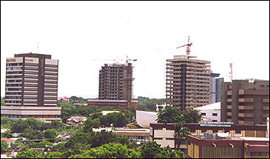 Expanded
revenue for Development Expanded
revenue for Development
Ghanaian officials say the government will give priority to key sectors of the economy such as agriculture, exports and manufacturing, as well as broaden the tax base to increase revenue to the government in order to achieve its aim.

Accordingly the tax base has been expanded with the re-introduction of the Value Added Tax (VAT) system in December 1998, (VAT was first introduced in 1995 but withdrawn due to widespread demonstrations against its implementation) to collect the kind of revenue that will enable the government to undertake development projects that will bring prosperity to the people. Given the date of its implementation, the impact is expected to be felt in the ensuing years. Pegged at 10 per cent, lower than the 1995 rate of 17.5 per cent, and a longer period of public education, it is hoped that VAT will not inject instability into the economy.
Some believe that the country may not be able to achieve its revenue targets, given the level of tax, but the revenue that will be mobilized during the year will confirm whether or not VAT succeeds in broadening the tax base and the increase revenue to the government.
According to some experts, the broadening of the tax base will have to go hand in hand with finding an anti-dote to the steep currency depreciation that the country has been experiencing over the past decade. The results of this mishap is that the country has been unable to close the trade gap with strong growth in both traditional and non-traditional products.
| Government is not banking all its hopes on revenue accruing from VAT alone for development. Other sources have been targeted as well; one such area is lotteries.
Revenue from lotteries contributes a large portion of the government’s consolidated account which is used for development. The Department of National Lotteries (DNL) with a weekly sale of 30 million dollars and a market share of fifty per cent is a major contributor. The Director of DNL, Colonel Martin Gbikpi believes that his company is raising the adequate revenue for the government’s development plans and added that "with computerization and expansion in the rural areas, we will be able to generate much more revenue".
Besides these efforts, the government is also seeking new markets for its non-traditional exports. Fortunately, as one of the countries that presently enjoys a lot of goodwill from America, because of the political and economic achievements, Ghana is marking her time to take advantage of the passage of the African Growth and Opportunity Act. The act, which is to be passed by the US Congress will open up the American market for some African products.
The specific provisions are that there will be expanded duty free-trade benefits, market access for textiles and some specific goods and support for African regional integration efforts. The Exim Bank and Overseas Investment Corporation will also increase their commitment to US investors in Africa and enhance trade and investment dialogue. |

